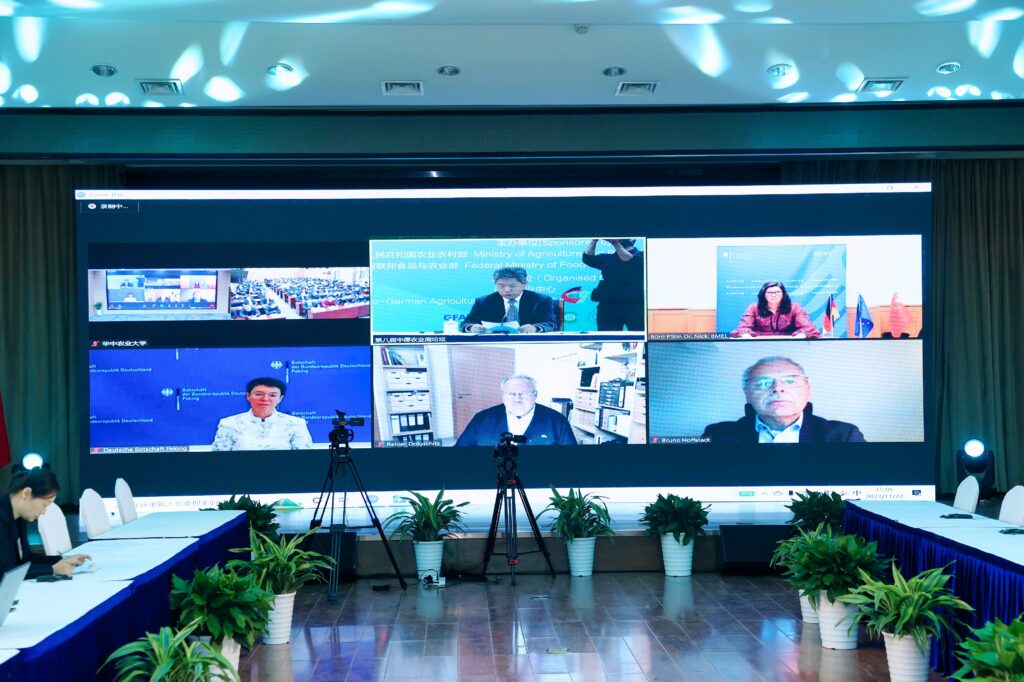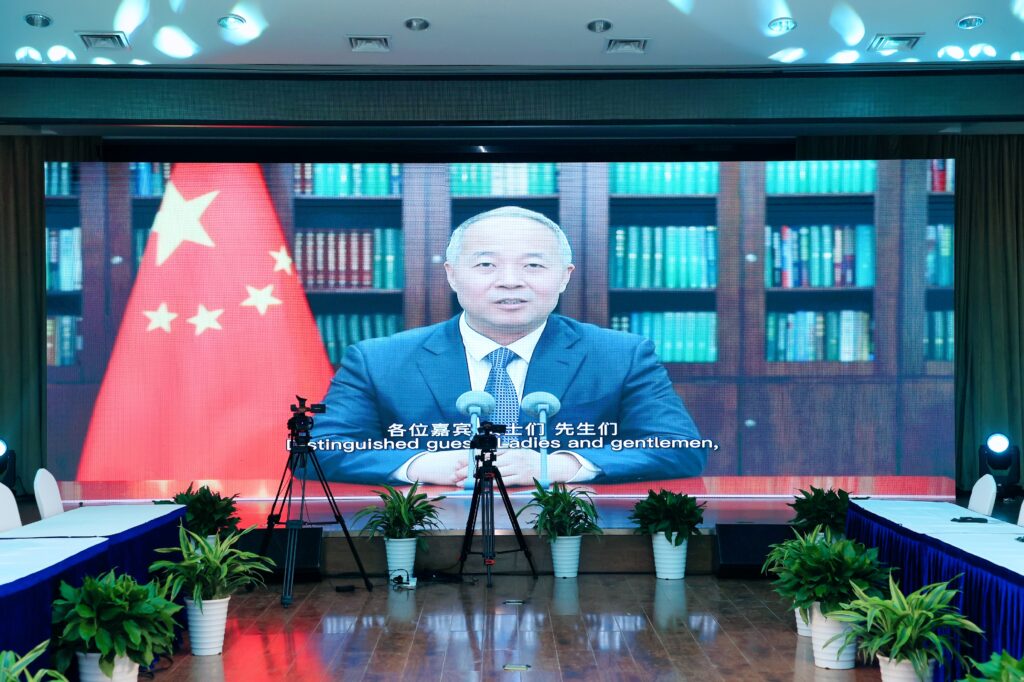The 8th Sino-German Agricultural Week (SGAW) was held from 21-25 November in Beijing. A flagship event of the Sino-German Agricultural Centre (DCZ), the SGAW has gained a reputation as an important platform for exchange within the context of bilateral cooperation between the German Federal Ministry for Food and Agriculture (BMEL) and the Chinese Ministry of Agriculture and Rural Affairs (MARA).
Due to a recent uptick of Covid-19 cases, the conference was shifted from a hybrid to an online format, with only the DCZ team and moderators present at the conference venue on the premises of the Foreign Economic Cooperation Center (FECC) of MARA in Beijing. The event was jointly supported by MARA and BMEL and organized by the Sino-German Agriculture Centre (DCZ).
The five-day event focused on tackling current and future challenges to domestic and global food security. A high-level forum offered expert perspectives on the current global food crisis and highlighted the contributions Sino-German agricultural cooperation can make to bolster food security and create a fair, stable, and sustainable agri-food system that works for all. Three thematic forums took a closer look at how digital technologies, seed development, and strategies to reduce food loss and waste can be leveraged to strengthen food security at the domestic and global level. The conference ended with an event showcasing the role of agribusiness and the closing session of the Sino-German Crop Production and Agrotechnology Demonstration Park (DCALDP) project.
The conference was broadcast online, reaching well over 1,000 viewers on Chinese livestreaming platforms and around 250 participants on Zoom.
Joint responsibility, joint opportunity
China hopes to deepen its collaboration with Germany on a range of areas such as digital agriculture, plant breeding research, and food loss and waste reduction as part of a broader effort to bolster global food security, Ma Youxiang, China’s vice-minister of agriculture, said in a recorded welcome speech at the high-level forum, jointly chaired by Zhang Lubiao, director general of FECC, and deputy director general Li Zhiping.
Parliamentary state secretary of the German Ministry of Food and Agriculture, Ophelia Nick, highlighted the world’s joint responsibility to move towards sustainable food systems in the face of conflict, climate change, and a growing global hunger crisis. Ms. Nick expressed hope that the Sino-German Agricultural Centre could become a platform for developing a joint transformation agenda for Germany and China that would contribute to achieving the goal of “zero hunger” while promoting the policy reforms necessary for meeting global climate, biodiversity, and sustainability objectives.
Patricia Flor, Germany’s ambassador to China, also addressed the forum virtually. Ms. Flor recalled the joint achievements following 50 years of Sino-German diplomatic relations and highlighted the growing importance policymakers attach to the issue of food security, including at German chancellor Scholz’ meeting with Chinese president Xi Jinping earlier this month.
The opening session was followed by keynote speeches from renowned food security experts – a session jointly chaired by DCZ managing directors Jürgen Ritter and Wang Geng. There was broad agreement amongst the keynote speakers that the deepening global food crisis reflects the structural failure of the agri-food system, requiring a full-scale transformation of the ways in which we produce and consume food. “Business as unusual” would be needed to ensure the stable supply of safe, nutritious, healthy foods to people around the world, Fan Shenggen, director of the Academy of Global Food Economics and Policy at China Agricultural University and one of the keynote speakers of the event reminded the forum. Reiner Doluschitz, professor emeritus and former director of the Food Security Center at the University of Hohenheim, Germany, called for a sustainability transformation of the agri-food system, balancing social, economic, and ecological aspects of food production and consumption. Joachim von Braun, distinguished professor at the Center for Development Research, University of Bonn, proposed an Intergovernmental Panel on Food Security to tackle the current challenges at the global level, while Lena Kuhn, senior researcher at the Leibniz Institute of Agricultural Development in Transition Economies (IAMO), reminded the forum of the potential of agricultural trade to pool risk and share benefits, cautioning against the protectionist trade policies with which some countries have responded to the global food crisis.
In addition, Zhu Jing, chair professor and director of Center for International Food and Agricultural Economics at Nanjing Agricultural University, and Jiang Nan, researcher at the Rural Economy Research Center of MARA, provided insights into the challenges and prospects for China’s food security. The high-level forum concluded with a panel discussion with four of the keynote speakers, chaired by DCZ experts Ahmatjan Rouzi and Michaela Boehme
Innovation in digital and breeding technologies key to achieving food security
Two forums dedicated to digital technology and seed development, respectively, took a closer look at the technological innovations needed to help use scarce agricultural resources more efficiently in the face of climate change and extreme weather events. Following introductions by Wang Maolin, director of the Reform Experiment Division at MARA, and Ursula Monnerjahn, head of the division “Digitalization in Rural Areas” at BMEL, elaborating on the digital agricultural policies pursued in China and Germany, experts from both countries presented some of the key benefits and challenges in rolling out digital technologies in agriculture. Discussions ranged from the possibilities afforded by digital technology applied in fruit production (Wu Wenbin, CAAS) to agri-photovoltaics as a possible solution to address the food–water–energy nexus (Kerstin Wydra, Erfurt University of Applied Sciences), to the potential of digital technologies to develop food value chains (Huang Jikun, Peking University) and optimize processes in animal production (Heinz Bernhardt, Technical University of Munich).
While practical questions such as increasing adoption rates amongst farmers were amongst the issues discussed at the final panel discussion, Patrick Noack, professor at Weihenstephan Triesdorf University of Applied Science, rightly reminded the forum that the spread of digital technologies alone is not an answer to the current food crisis. What is needed are coherent policies that harness the potential of digital agriculture to promote food security, Mr. Noack said.
Plant breeding and seed development are also key areas where technological breakthroughs can help strengthen future food production. By increasing yields, improving resistance to heat, drought, and pests, as well as enhancing biodiversity, improved plant varieties can make agricultural production more resilient to the impacts of climate change and promote sustainable production, experts at the forum agreed. Following welcome speeches by Zhang Dongxiao from the Department of Seeds Management at MARA and Bruno Hoffstadt, head of the International Projects and Twinning division at BMEL, Chinese experts Li Xinhai from CAAS (Chinese Academy of Agricultural Sciences) and Yao Yingyin from China Agricultural University offered an overview of China’s achievements in wheat and corn breeding, while Stefanie Hagemann from Julius-Kühn-Institute and Petra Jorasch from Euroseeds gave insights into research collaboration and the latest plant breeding innovations from the breeding sector in Europe.
The forum concluded with a panel discussion chaired by Li Yumei from China Agricultural University and with panelists Beate Rücker from the German Federal Plant Variety Office, Dieter Rücker from the German Plant Breeders´ Association, Tian Weihong from the China National Seed Trade Association, and Feng Xiahui from Longping Agriscience – China’s leading developer of hybrid rice varieties. Emphasizing some of the points made earlier by Ms. Jorasch, Mr. Rücker advocated for a more lenient stance of the EU regulatory authorities towards new breeding technologies such as gene editing, which, he said, would be needed to meet the United Nations 2030 sustainability agenda and maintain European competitiveness in seed development. Experts at the panel also talked about the need to establish a fair international varieties’ system that would not only protect breeders’ rights but also enable the sharing and exchange of plant genetic resources without which no progress in breeding can be achieved. “No country can do it alone, we need to work together” was one of the key messages of the panel.
Reducing food loss and waste is equivalent to increasing production
A third forum focused on strategies to reduce food loss and waste. With one third of all food lost at various stages of the agricultural value chain, the contribution that food loss reduction measures can make to food security is evident. It is therefore no surprise that the topic of food loss and waste has been a cornerstone of the policy and science dialogue promoted by the Sino-German Agricultural Centre (DCZ) over the past years, as forum chair Eva Sternfeld from the DCZ emphasized (see for example DCZ policy brief on China’s food loss and waste reduction measures that was produced as part of this dialogue).
While in developing and emerging countries most food loss occurs at the production and post-production stage, in developed countries, it is during consumption when most food is wasted. Consequently, policy makers in China stress the need to reduce losses during harvest, as evidenced in the welcome address by Liu Xiaowei from MARA. In contrast, Germany’s food loss and waste reduction measures focus on educating private households and creating public awareness through initiatives such as the “Too Good for the Bin” campaign, explained Nathalie Banz from BMEL.
In the following sessions, Cao Guangqiao from the Nanjing Institute of Agricultural Mechanization, Liao Xiaojun from China Agricultural University, and Cao Baoming from Nanjing University of Finance and Economics provided insights into the technical solutions such as improved machinery with which China is trying to reduce food loss and waste during harvesting, storage, transport, and processing. Wang Fengzhong from CAAS highlighted the significance of governance, with China’s 2021 Anti-Food Waste Law a milestone in combating food loss and waste, as well as the need for technological collaboration between China and Germany, while his colleague Huang Jiaqi focused on the opportunities in reducing food waste in Chinese restaurants and the online food delivery sector. Yanne Goossens from the Thuenen Institute for Market Analysis presented a sustainability assessment model that had helped dozens of German food processing companies to reduce food waste, thereby not only saving emissions but also generating economic gains. While Manuela Zude-Sasse from the Leibniz Institute for Agricultural Engineering and Bioeconomy shed light on how new models based on sensor data could help fruit farmers use resources more efficiently, her colleague Giacomo Rossi introduced circular economy concepts that use insects to valorize food waste. Finally, Judith Stiegelmayr from Community Kitchen München – winner of the German government’s initiative “Too Good for the Bin” – showed forum participants how her project was helping reduce food waste through practical actions on the ground.
Demonstration projects put Sino-German agricultural collaboration into practice
The final day of the conference was dedicated to the closing ceremony of the Sino-German Crop Production and Agrotechnology Demonstration Park (DCALDP). Following opening remarks by Bruno Hoffstadt from BMEL and Friedericke Dörfler, agriculture counsellor at the German embassy in China, the project partners including German team leader Alejandro Alberto Figueroa von Fabeck reviewed the achievements of the project, including measures to reduce the use of fertilizer and pesticides while maintaining yields, thereby contributing to a new paradigm of sustainable food security that several experts and policy makers had been calling for throughout the 5-day event. Agribusiness representatives from CLAAS, Bayer, BASF, and Chinese state farms SKIAD and Hulun Buir, amongst others, also spoke at the closing ceremony, expressing their interest in continued exchange and showcasing the practical contributions agribusiness can make to promote sustainable food production in Germany, China, and globally.
Conference materials & downloads
Download the full conference program here.
Our conference report summarizes the contributions and debates at the 8th Sino-German Agricultural Week.
All five days of the 8th Sino-German Agricultural Week have been recorded and can be watched online. Click here to access the recordings. Choose 英文 for English.
Download the presentations of our speakers here.
SGAW | Day 1
Digital technologies for agricultural and food value chain development in China, Huang Jikun
Climate mitigation and climate adaptation through agri-photovoltaics, Kerstin Wydra
SGAW | Day 2
Challenges for agriculture and sustainable solutions for food security, Reiner Doluschitz
Food security development in China: status quo and challenges ahead, Zhu Jing
Toward global and domestic food security in challenging times, Joachim von Braun
Food security in global perspective, Lena Kuhn
Situation and policy trend of China’s food security, Jiang Nan
SGAW | Day 3
SGAW | Day 4
Germany’s national strategy for food waste reduction, Nathalie Banz
Promoting green food loss reduction through S&T innovation, Wang Fengzhong
Constraints and countermeasures to grain loss reduction by machine harvesting, Cao Guangqiao
Digital solutions for reducing food waste – introducing spectro food project, Manuela Zude-Sasse
Enhancing technological innovation in food saving to reduce food waste, Liao Xiaojun
China’s practice and experience in grain storage and transportation, Cao Baoming
Combating Food Waste in China: Policies and Practices in Consumption, Jiaqi Huang
Voices from the 8th Sino-German Agricultural Week
To recapitulate what we’ve learned at the event, we’ve asked some of our speakers to summarize their key points in short video interviews. Watch what our experts have to say below.






